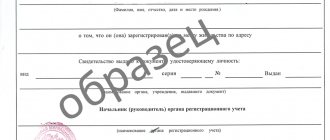The birth of a child is a joyful event, but it entails a lot of different troubles. Parents can expect not only the joys of fatherhood and motherhood, but also a huge amount of paperwork associated with registering the arrival of a new citizen of the Russian Federation into the world. Instructions on the State Services website, designed to clarify this issue, sometimes only drive unprepared mothers and fathers into panic - that is why FAN turned for advice to the chairman of the board of the All-Russian public organization for the support of motherhood and childhood “Council of Mothers” Tatyana Butskaya . In an interview for our publication, she named the mandatory steps that parents should take in the first weeks after the birth of a child.
How long does it take to register a baby?
Laws in the country change frequently, so it is better to check with the passport office about the registration period. In addition, each region or district has a different interpretation of the legislation - one that is beneficial for them. The required documents may not be needed, but in other areas, on the contrary, additional certificates will be requested.
The registration process is carried out by employees of the passport office at the place of registration.
In accordance with Federal Law No. 5124 “On the right of citizens to freedom of movement...”, adopted on June 25, 1993, 1 week is allotted for registration.
That is, no later than 7 days from the moment the child is brought home, you must submit an application to register the baby.
Passport office staff recommend registering a newborn within 30 days of birth. The Code of Administrative Proceedings (Article 19.15) states that registration must be done within 90 days. In case of violation, a fine is imposed. But it can be challenged.
Registration of registration itself takes up to 7 days.
What the law says
The procedure for registration is established at the legislative level.
The list of main laws that regulate this problem includes:
- Civil Code - Article 20 establishes that parents are obliged to register a newborn at the place of their own registration;
- Housing Code - establishes a list of residential premises that are suitable for living;
- Code of Administrative Offenses – establishes a penalty for late registration;
- Federal Law No. 5124 “On the Rights of Citizens...”.
The legislation also sets deadlines that cannot be violated.
Article 65 of the Family Code states how to act if parents live separately. The procedure for registering newborns is regulated by Article 28 of the Family Code. A list of documentation for registering a baby is also listed here.
Let's take a closer look at all the controversial issues that relate to the registration of a child after birth:
- Issuance of compulsory medical insurance policy. It is generally accepted that it cannot be obtained without first registering the child. However, according to the law on health insurance, organizations are required to issue a policy to a newborn, even if his parents have not registered him. But the mother must have this registration.
- Receiving benefits. In such a situation, it does not matter what kind of registration the child has - permanent or temporary. However, it is necessary to register a newborn in order to receive benefits.
- Obtaining family capital. It is impossible to obtain a certificate for the use of maternity capital without registering the child at the place of residence of the parents.
- Registration for kindergarten. In order to put a child on the kindergarten queue, and then to go to a preschool institution, you must first obtain a registration. By the way, it may be temporary.
Liability and fines
For missing the period established by law, a person is punishable by an administrative fine .
The amount of the fine for late registration of a newborn under Art. 19.15.1 of the Code of Administrative Offenses of Russia is from 2 to 3 thousand rubles.
In the case of a child, his parents are punished as the persons responsible for him . In practice, registration authorities try not to resort to such measures and not to lead to fines , since when a baby is born there is a lot of worries and missing a deadline is a common occurrence.
You will still have to register your child, since without this it is impossible to easily obtain places in kindergartens, be assigned to a clinic, etc.
How to register a newborn and what is needed to register a newborn in an apartment? What steps should I take? Let's consider the procedure for registering a child at birth .
Rules
In accordance with legislative acts, it is allowed to register the baby in the living space either by the father or the mother. You cannot register to stay with your grandparents in their apartment.
Basic Rules:
- it is easiest to register a newborn in the first 30 days;
- if a child is registered with his father, then a statement from both parents is required, and from the mother it must be certified by a notary;
- the law provides for a fine if parents do not register the baby for a long time;
- If the registration is temporary, then you can only register with your mother.
There are two ways to register a child – temporarily and permanently. For newborns, option 2 is desirable.
Only parents can register a child.
If registering with the father, then both mother and father must be present. If to the mother, the presence of the father is not necessary. It doesn’t matter whether it’s a house or an apartment, you can register a newborn baby without asking the property owner to do so.
Requirements for the property
The law does not provide for any special nuances regarding where a newborn child can be registered. The main thing is that the room is intended for living:
- private apartment or house;
- municipal housing;
- rented premises and so on.
The meaning is simple: if the parents were able to register at the address, then the baby can be registered there too. Consequently, it will not be possible to obtain legal residence in an office or kindergarten (that is, in non-residential premises).
In addition, the answer to the question of where a newborn child is registered by law if he has no parents (died or deprived of parental rights) depends on the presence of official guardians and trustees. If they exist, the baby is registered with them; if they are not, in government institutions, for example, orphanages, for example.
The laws do not specifically prohibit the registration of young children in mortgaged real estate.
Theoretically, nothing prevents you from registering a child after birth in the apartment for which the loan is issued. However, the banks themselves, as mortgagees of property, can put forward their own conditions. For example, they often instruct the owner:
- notify children about their registration;
- draw up a receipt in which the owner undertakes to write out all family members in the event that the mortgage debt is not repaid.
Determination of place of residence
It is allowed to register a child only at the place of residence of the mother and father. If the parents are not married or have registration at different addresses, then the baby can be registered with one of them. But if both parents agree to this. This rule is regulated by the Civil Code.
If the father or mother is registered in the apartment (house), but is not its owner, then the newborn can be registered without the consent of other residents, including the owner of the property. The law allows for the registration of a child regardless of the parents' ownership rights to this property.
Where to apply?
When registering a child, you must comply with legal regulations. After receiving the birth certificate, you must visit the passport office and submit documentation.
You can register your baby with the following government agencies:
- Multifunctional centers. Documents are handed over at the nearest branch against receipt of receipt. After this, a center employee will call and set a date when you can pick up your registration documents.
- Government services. After registering on the site, enter your data. After checking them (within 3 days), an invitation to register will be sent to the applicant’s email address.
The data must be entered truthfully. If you make a mistake, registration may be denied.
Procedure for registering a newborn child with married parents
The procedure for registering a newborn child with parents can be completed in one day, if you first prepare all the necessary certificates and documents.
- First you need obtain a child’s birth certificate from the regional registry office, which one of the parents can receive if they are officially married. Provide the following documents to the registry office:
- Russian passport;
- a certificate from the maternity hospital indicating the date, time and place of birth, as well as the weight and gender of the child;
- marriage certificate.
- After receiving your birth certificate, you must go to the passport office to register a child. At the passport office you need fill out an application for child registration using form No. 6. The form is provided by the passport office employee. Along with the application you must provide the following documents:
- Birth certificate + copy;
- Passports of BOTH parents + copies;
- Marriage certificate;
- If a child is registered in an apartment, an extract from the house register about registered persons in this apartment is needed. It is taken from the passport office there. If a child is registered in a private home, then a house register is needed, which should be in the hands of the owners.
- A certificate about the status of the personal account of the housing where the newborn baby will be registered. It is taken from the accounting department of the passport office.
- After submitting the documents and application, the passport office employees collect the passport and birth certificate . If a child is registered in a private home, a corresponding entry is made in the house register. The registration period is usually from 1 to 7 days. There, parents can put a record of the birth of a child in the “children” column in their passports.
- On the appointed day, pick up the child’s passports and birth certificate.
Instructions for registering a newborn child with his mother
- Obtain a child's birth certificate . You should remember: if the child's parents are not officially married and the father does not come to the registry office and confirm his paternity, then the newborn child will not be able to be registered with him, because the child does not have a documented father. If the parents are officially married, then one of the parents can receive the certificate. The procedure for obtaining a birth certificate is described above.
- Next you need go to the passport office to register a child. At the passport office you need fill out an application for registration (registration) of a child using form No. 6. The form is provided by the passport office employee. Together with the application provide:
- Mother's Russian passport (original and copy);
- Child's birth certificate (original and copy);
- A title document confirming ownership of a home. Usually this document is a certificate of ownership, but if it is not there, then an extract from the Unified State Register of Real Estate about the property will do. Here is a link to instructions for obtaining this extract. If there are no documents confirming ownership of the apartment, then a foundation agreement will do. A foundation agreement is a document on the basis of which there is ownership of real estate. This document can be: an apartment purchase and sale agreement; transfer agreement; certificate of inheritance; rental or investment agreement; If the housing is municipal, then a social tenancy agreement is suitable.
- An extract from the house register about registered persons in the apartment in which the child will be registered. It is taken from the passport office there. If a child is registered in a private home, then you just need a house register, which should be in the hands of the owners.
- If a month has passed after the birth of the child, a certificate of registered persons at the father’s place of residence (extract from the house register) is required. It states that the child is not registered with him. This certificate is taken if the father is registered in the apartment. If it is registered in a private house, then submit the house register itself;
- Certificate about the status of the personal account of the housing in which the child will be registered. It is taken from the accounting department of the passport office;
- After submitting the documents and application, the passport office employees collect the passport and birth certificate . If a child is registered in a private home, a corresponding entry is made in the house register. The registration period is usually from 1 to 7 days. There you can also record the birth of a child in your passport in the “children” column.
- On the appointed day, pick up the child’s passports and birth certificate.
Registered. What benefits can be derived from this?
In addition to the advantages of registering a child described above, there is another important point that young parents rarely think about. This refers to the opportunity to move to a more spacious apartment.
Almost all constituent entities of the Russian Federation provide housing to those in need of improved housing conditions. You can also get an apartment for free (if you wait in line, and the line can be quite long). And you can, without expecting it, receive a subsidy in the amount of 10 to 70% of the cost of housing. But in order to participate in the subsidy program, you need to be truly in need.
Who are those in need from a legal point of view?
Figures vary depending on the region, but on average, families in which each family member has less than 10 m2 are considered to be in need. So if you live in a one-room “Khrushchev” apartment (the area of such apartments is usually 27-29 m2), then the birth of your first baby already gives you the right to apply for new housing!
You can read more in the material: preferential housing: how to get an apartment for free or at a big discount.
[Back to the beginning of the article]
Is it possible to register a child somewhere without the consent of the father?
The law does not allow a child to be registered without the consent of the father if he is officially recognized.
If a dispute arises, it is resolved through court. But the law allows cases when a child can be registered with the mother without the consent of the father:
- if the father is deceased or recognized as such by a court decision;
- if the father was declared missing;
- if the father is declared incompetent;
- when the father is deprived of parental rights;
- when the father was recognized by the court as a threat to the life and health of the mother or child;
- when the father is serving a sentence in prison;
- when he undergoes compulsory military service.
In all of these cases, the father's consent is not required. You just need to submit the appropriate document (court decision, death certificate) to confirm the existence of a special circumstance.
However, conscript military service should not be confused with contract service. During contract service, a serviceman can live in official housing. In this case, he has every right to register his child with himself, so his consent will need to be obtained from the mother for registration.
Register with grandma
From the age of 14, a citizen can independently decide where he will live. He can register with his grandmother or other relatives. Until the age of fourteen he lives with his parents. Therefore, the registration of a child with his grandmother is legal only if his mother (father) lives with him.
One child will be able to register only after 14 years of age. Why do they decide to change their place of registration?
- The need to register for kindergarten or school.
- Temporary absence of parents in the city or country.
- Receiving benefits or subsidies.
An additional requirement is to obtain consent from all co-owners of the living space.
How to register a newborn baby with a grandparent
You can register a newborn with your grandparents, as well as with other close relatives of the child’s parents in the following cases:
- if the parents themselves are deprived of parental rights;
- if they live together with such close relatives.
Moreover, if parents are deprived of parental rights, then in order to register a newborn with close relatives, you need to register their guardianship and obtain their consent to registration. Otherwise, the child becomes a ward of the state. Guardianship is formalized through the local guardianship authority, as well as through the court.
If the parents live in the house of close relatives, then their consent is not required to register the child.
The law establishes that the right of a parent to register their children at their place of residence is indisputable and does not require the consent of the owners of the relevant residential premises.
Is the owner's consent required for the registration of a newborn?
The presence or absence of parents' ownership of the housing in which they live is not a determining factor for registering a child there. So, according to the law, only the official registration of the parents matters.
In this case, registration is carried out without the consent of the owner and other people living in the relevant housing. However, in this case, the owner of the property may, through the court, demand that the parents themselves be evicted, after which their children will also not be able to be registered there.
Content
- Registration. What is it and what rights does it give?
- Does a newborn need a registration?
- Registration of a newborn: deadlines and fines.
- Where can a newborn be registered?
- How to register a child: step-by-step instructions for registering a child.
- What documents are needed to register a newborn?
- Where do you register?
- We register a newborn through State Services
- Lifehacks. What benefits can be derived from registering a child?
- Bottom line.
Registration of non-permanent registration
the process is quite simple. Parents only need to collect the necessary documents and contact the passport office.
When might a child need temporary registration? There are a number of situations in which it is impossible to do without registering the baby at the place of residence of the parents.
It is necessary to consider these cases and various nuances in more detail:
- parents have temporary registration (for example, in case of moving to another city or region). In this case, the non-permanent registration of the newborn acts as a kind of “addition”. The consent of the homeowners is not necessary, since such registration does not affect the mechanism of inheritance and ownership of the living space;
- mother and father live together, but are registered at different addresses. While the parents decide where exactly it is best to register the baby (and this may take time), the child needs to get a temporary registration;
- the parents of the newborn are not registered, there is no agreement between them about where the baby should be registered. Usually such disputes are resolved in court, but for now the child will need temporary registration;
- relatives offer to register the baby in their living space in order to simplify the inheritance mechanism or receive any benefits when paying for utilities. In this case, the mother and father must also be temporarily registered at this address.
In order for the child to be able to use medical and other services in full, it is better to give him a temporary registration if permanent registration is for some reason impossible or postponed for the future.
As already noted, in order to register a child on a permanent or temporary basis, the parent must also be registered in this area. That is, you cannot register a child with a grandparent if one of the parents is not registered there.
This strictness is due to the fact that, according to Russian law, parents are obliged to take care of the baby while living together with him.
It is important to understand that if the living space does not belong to the mother or father, the children will also not be able to make a claim to participate in the inheritance, regardless of the type of registration. And vice versa, if the mother and father are the owners of privatized housing, the child registered here will claim part of the property
.
A single father has exactly the same rights as a single mother, so he can also obtain registration for a newborn. But in addition, he will need to provide a certificate of death of the mother or her official refusal to raise the baby (a certificate of deprivation of her parental rights).
It is curious that when registering a baby, you do not need to ask the permission of the other residents of this living space. Registration will take place even if other residents categorically oppose such a legal procedure.
If the child is not registered for the first time, two copies of the de-registration coupon (also known as the “departure slip”) are submitted. This coupon is issued upon discharge from the previous place of residence.
A child can be registered in an apartment or house, even if the area of the housing does not meet the standards for residential premises. This clarification was adopted in order to protect children from the fate of becoming a person without registration.
1.What is registration and what rights does it give?
The word “registration” excites the minds of not only parents, but also everyone who has had to deal with buying apartments or moving to another city. What kind of magical piece of paper is this, what dangers and benefits does it contain, and is it possible to lose your apartment if you register in the wrong place? Let's figure it out. In fact, everything is simpler than it seems.
The legal significance of registration and what rights to an apartment it gives. History of the concept and meaning of registration in 2021. (Click to expand text).
The word “registration” is familiar to every Russian. However, few people know that the term “propiska” is a relic of Soviet times, and there has been no such concept in the legislation of the Russian Federation for a long time. And there is registration - permanent and temporary. Let's figure out what the difference is and what the point is in all these bureaucratic manipulations.
In the Soviet Union, no one personally owned housing. All real estate belonged to the state, which granted citizens the right to live in it. The right to be in a particular apartment was given by “registration” - paper permission from the state to live at a particular address. That is, during the Soviet Union, this piece of paper was the only document granting the right to this or that housing. Popular misconceptions and horror stories about the dangers of registration (“register her with you, and then she will take your apartment away!”) are still popular today and have their roots in the Soviet past. In fact, almost all of them are groundless and here's why:
After the collapse of the USSR, such a concept as private property appeared in Russia. Now citizens can own apartments - that is, manage them completely as their own property. The right to ownership is acquired upon purchase or privatization of an apartment and is confirmed by completely different documents that have nothing to do with registration. The owner can do whatever he wants with his apartment (rent, sell, etc.).
And he (and not the state, as before) can register, that is, give permission to live, to other people in his apartment. Please note: the owner can either register or discharge any tenant at his discretion.
Registration (renamed “registration at the place of residence”) remained a document that gives its owner the only right: to live in the apartment in which he is registered.
Registration at the place of residence gives the right only to reside at the place of registration. Non-owners registered in it cannot have any property claims to the apartment.
However, in addition to securing the right to residence, registration at the place of residence performs a number of functions:
- Firstly, registration is required by law. Every citizen must register with the Federal Migration Service at the place of his permanent residence (parents register children). This is necessary for demographic and legal control over the population. Staying on Russian territory without registration is subject to a fine;
- Many free social services are based on territoriality and are provided at the place of registration. These include: a clinic (and receiving baby food at the site),
- kindergarten and school,
- receiving cash benefits after childbirth.
And although in Russia the strictness of the implementation of laws is uneven and varies greatly not only between cities, but also between individual districts of the same city, the chance of being denied any service without this document is very high.
Registration can be permanent (without expiration date) or temporary. In common parlance, the first is called “registration”, and the second – “registration”.
You need to understand that there is no difference between permanent and temporary registrations. They differ only in terms of validity, but give their holders exactly the same rights.
[Back to the beginning of the article]
Now that we have looked at the legal basis of registration at the place of residence, let's move on to their practical application.
In what cases can they refuse?
Where is the place where the child's birth is registered?
State registration of the birth of a child is carried out by the Civil Registry Office, after which a birth certificate is issued. This is the main document that will be required to register the baby. Will a newborn be registered? To register a child after birth, you can contact the passport office, the Multifunctional Center (MFC) or complete all actions through the State Services portal.
In any case, for correct and quick registration, you will need to prepare a certain package of documents in advance.
Registration of a newborn at the place of residence may be denied if these papers are filled out incorrectly, their validity period has expired, they are presented in an inappropriate form, or they are incomplete. In this case, after correcting all the shortcomings, applicants can repeat the application. In addition, the refusal may be made based on the fact that the place of registration of the child must necessarily coincide with that of at least one of the parents.
Is it possible to register a newborn with relatives?
If you try to identify the baby to grandparents, as well as other relatives or third parties, there will be an unequivocal refusal. If, during separation, the second parent does not give written consent, then the registration of the baby may also be postponed until the representatives resolve all their disagreements on this issue through contractual or judicial means. Thus, the law determined the terms and rules for registering an infant at the place of residence. When it comes to a newborn, the procedure is considered significantly simplified.
However, for correct and timely registration, it is necessary to collect the required package of papers.
Failure Cases
When can they refuse? Refusal may be due to the fact that the package of papers has not been submitted completely or incorrectly.
Some certificates or documents may be expired , so you should take care of this in advance. In addition, in the case of a newborn, a refusal may be issued due to his separate registration with his parents.
There cannot be a refusal due to lack of living space, since this indicator is not taken into account for a newborn.










